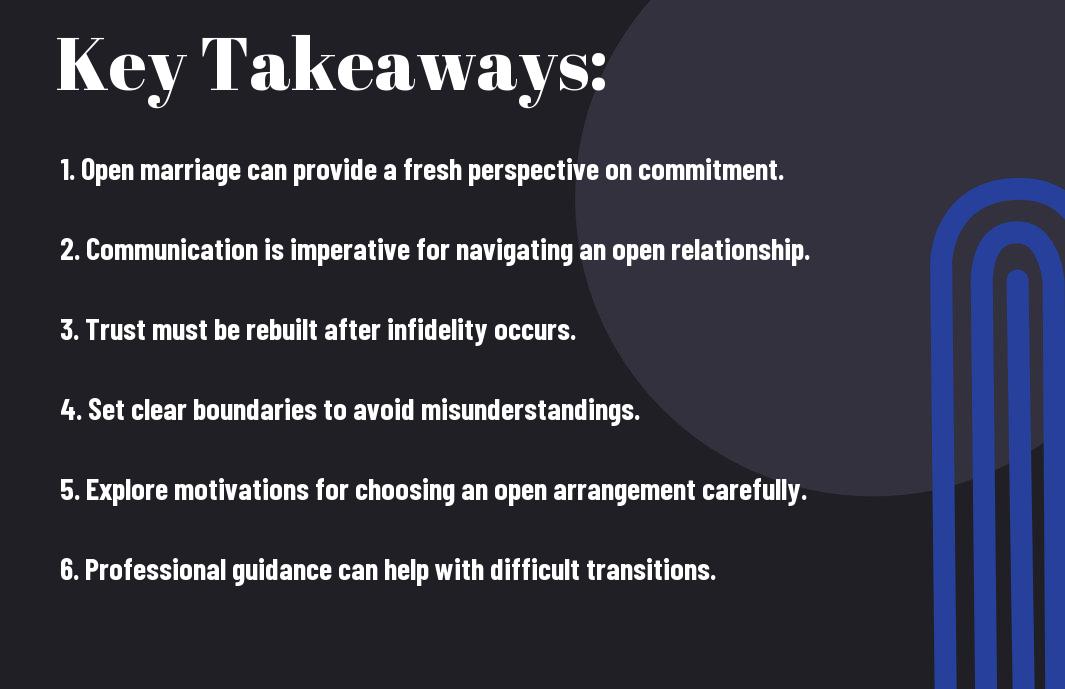It’s necessary to understand that navigating open marriage after infidelity can be a complex journey for you and your partner. While some couples find that embracing an open dynamic helps rebuild trust and intimacy, others may struggle with feelings of jealousy and insecurity. Before considering this path, you’ll need to have honest conversations about boundaries, expectations, and emotional readiness. In this post, we’ll explore the potential benefits and challenges of an open marriage after infidelity, helping you determine if it could work for your relationship.
Key Takeaways:
- Open marriage can be a solution for couples who experience infidelity, offering a way to rebuild trust and intimacy.
- Clear communication and boundaries are imperative for successful implementation of an open marriage.
- Both partners must be willing to engage in honest discussions about feelings, fears, and expectations related to the open arrangement.
- It is important to assess the underlying issues in the relationship that may have led to infidelity before considering an open marriage.
- Professional guidance, such as couples therapy, can provide support and tools to navigate the complexities of an open relationship.
- Regular check-ins and adjustments to the arrangement can help address any emerging concerns and reinforce trust.
- Not all couples will find an open marriage beneficial; personal values and relationship dynamics play a significant role in its success.


Understanding Open Marriages
Your exploration of open marriages begins with understanding the fundamental concepts and dynamics that underpin this relationship style. Open marriages allow partners to engage in sexual or romantic relationships with others, while still committing to their primary relationship. This approach can foster trust, communication, and honesty, but it’s important to recognize the potential challenges and emotional complexities that may arise.
Definition and Concepts
After delving into open marriages, you’ll discover that they are not merely about physical encounters with others. Instead, they emphasize open communication and shared boundaries. This relationship model can differ significantly from conventional monogamy, urging you to define what “openness” means to you and your partner.
Historical Context
Behind the modern conception of open marriages lies a rich tapestry of human relationships. Throughout history, many cultures have embraced non-monogamous practices, often stemming from economic, social, or cultural needs. Various indigenous societies practiced forms of polyamory for clan building, while some contemporary movements promote open relationships as a way to challenge traditional norms and embrace sexual freedom and personal growth.
Concepts surrounding open marriages have evolved significantly over time. Early forms of non-monogamous relationships can be traced back to ancient civilizations such as the Greeks and Romans, where public polyamory was accepted. In contrast, modern society frequently intertwines these practices with movements advocating for LGBTQ+ rights, which have highlighted the validity of diverse relationship structures. By examining this historical context, you gain valuable insight into the complex nature of adult relationships and the shifting perceptions of love and commitment throughout human history. Open marriages can be a reflection of this progress, allowing you to explore deeper levels of intimacy and connection with your partner.
The Impact of Infidelity
The impact of infidelity can be devastating, often shaking the very foundation of your relationship. Feelings of betrayal, anger, and hurt can arise, leading to significant emotional upheaval for both partners. This turmoil can alter how you view each other and the trust that previously existed, forcing a reevaluation of your relationship’s future. Understanding these impacts is vital to deciding whether an open marriage might be a viable solution for you moving forward.
Emotional Consequences
Around infidelity, you may experience a whirlwind of emotions, ranging from sadness and despair to conflicting feelings of love and hatred. The emotional fallout can lead to intense feelings of inadequacy and doubt about your worth and your partner’s commitment. It’s important to recognize these emotions and consider them when assessing your relationship’s future.
Trust and Relationship Dynamics
An open marriage after infidelity challenges the existing trust and dynamics between partners. You may find that rebuilding trust requires an honest exploration of boundaries and communication. Your relationship dynamics may shift significantly; some partners may feel threatened, while others might embrace the newfound honesty. Navigating these feelings requires diligent effort and vulnerability, as openness can lead to a deeper understanding of each other’s needs and desires.
Emotional healing is a necessary step in rebuilding your relationship dynamics. You’ll need to confront the deeper issues that led to infidelity and discuss your emotional responses transparently. This can be a transformative process that strengthens your bond if approached with care and empathy. However, be aware that if either partner remains unwilling or unable to communicate openly, it could lead to further resentment and emotional distance instead of intimacy. By fostering trust and nurturing open dialogue, you can create a fertile ground for a relationship that evolves positively, even after the scars of infidelity.
Evaluating the Decision to Transition
Despite the complexities surrounding infidelity, transitioning to an open marriage may offer a pathway to healing and growth. However, it’s necessary to carefully evaluate whether this arrangement aligns with your values and relationship goals. Consider if both partners are genuinely interested in this lifestyle change and willing to navigate the challenges that may arise during this transition.
Assessing Personal Feelings
Any decision regarding your relationship must begin with a deep reflection on your personal feelings. Assess how you feel about the infidelity, your partner, and the idea of an open marriage. Acknowledging these emotions can help you determine if pursuing an alternative relationship structure is the right move for both of you.
Communication Between Partners
Below the surface of an open marriage lies the need for strong communication between partners. It’s vital to engage in open and honest discussions about your fears, expectations, and boundaries. Clear dialogue will allow both partners to express their needs and create a framework that protects your emotional well-being.
Evaluating your need for open communication can significantly influence the success of your relationship transition. You may need to set regular check-ins to discuss feelings and adjust boundaries, ensuring that both partners feel heard and respected. Active listening without judgment will foster a safe space to navigate the inherent challenges. By prioritizing transparency and vulnerability, you can build a stronger bond and mitigate potential misunderstandings or resentment as you explore this new phase together.
Setting Boundaries in an Open Marriage
Now that you’ve decided to explore an open marriage after infidelity, establishing clear boundaries is important for maintaining trust and respect. You and your partner should have candid discussions about what is acceptable and what isn’t. These boundaries help prevent misunderstandings and ensure that both parties feel secure in their relationship while pursuing connections outside the marriage.
Essential Guidelines
On your journey towards an open marriage, it’s important to create guidelines that help navigate new dynamics. Begin by discussing emotional and physical limits, what activities are permissible, and how often you’ll communicate about outside relationships. Clear guidelines can mitigate potential conflicts and foster a supportive environment.
Negotiating Terms
On the path to an open marriage, you’ll need to negotiate terms that suit both you and your partner. Take time to express your desires and fears openly, ensuring that both partners feel heard and valued. Every couple’s needs are unique, so tailoring agreements will better empower your relationship.
Consequently, when negotiating terms, consider addressing vital aspects such as sexual health, intimacy levels, and the emotional connections you are both comfortable with. Discuss safe sex practices to prevent health risks, and agree on the frequency of check-ins to ensure both partners remain comfortable. Establishing these terms will help create a sense of stability, allowing you to explore relationships outside your marriage while prioritizing the trust and commitment within your primary relationship.
Success Stories and Challenges
Not every marriage can successfully transition to an open dynamic post-infidelity, and it requires ongoing communication and honesty. Couples who have managed to navigate this journey often find renewed intimacy and a deeper understanding of each other’s needs. However, it’s crucial to recognize that the path can be rocky, and challenges may arise as you redefine your relationship boundaries.
Positive Outcomes
Above all, couples who have embraced open marriage after infidelity often report a renewed sense of trust, improved communication, and a strong emotional connection. By sharing their experiences and desires freely, partners develop a deeper understanding of each other, leading to enriched relationships. Moreover, many find that exploring other romantic connections strengthens their bond and revitalizes their commitment to each other.
Common Pitfalls
On the other hand, couples venturing into open marriage can encounter significant challenges, including jealousy, insecurity, and miscommunication. These issues can undermine the very foundations of your relationship if not properly addressed.
Also, it’s important to recognize that engaging in an open marriage can lead to emotional turmoil if boundaries are not clearly defined or if expectations are misaligned. Jealousy may emerge unexpectedly, causing strain on your relationship. Additionally, lack of effective communication can leave both partners feeling unheard and unappreciated. Make sure you prioritize regular check-ins to discuss feelings and concerns, ensuring that you both remain aligned on your journey towards a successful open marriage. Trust and transparency are key components for navigating potential pitfalls, and being proactive can help mitigate challenges.

Professional Insights
Many couples facing the aftermath of infidelity find themselves contemplating open marriage as a possible solution. Insights from experts in relationship dynamics suggest that while this option can lead to new freedoms, it also carries risks. As seen in one couple’s experience detailed in this article, My husband has asked for an open marriage after …, a thorough discussion and mutual agreement on boundaries are crucial for a successful transition.
Expert Opinions
Beside the emotional fallout, experts highlight the importance of effective communication. Open marriages demand an understanding of each partner’s needs and desires, which can alleviate feelings of betrayal and help build a new foundation based on honesty.
Psychological Perspectives
Across many studies, the psychological effects of transitioning to an open marriage reveal both challenges and potential benefits. Navigating guilt and mistrust can complicate your emotional landscape, but engaging in open dialogue about boundaries and desires may lead to greater intimacy and understanding.
Plus, it is crucial to recognize that entering an open marriage after infidelity can catalyze both healing and tension. While some individuals may experience increased self-awareness and freedom, others might grapple with feelings of insecurity and jealousy. Balancing honest communication with respect for each other’s emotional needs is key as you navigate this journey together.
To wrap up
Taking this into account, exploring an open marriage after infidelity can be a viable path for you, but it requires open communication, trust, and clear boundaries. You need to assess your feelings and motivations, ensuring both you and your partner are on the same page. Whether this arrangement will work ultimately depends on your willingness to navigate the complexities that come with it. Be prepared for ongoing discussions and adjustments as you commence on this new chapter in your relationship, and prioritize understanding and respect to foster a healthier connection moving forward.
FAQ
Q: What is an open marriage after infidelity?
A: An open marriage after infidelity is a relationship approach where partners agree to maintain their marriage while allowing each other to engage in romantic or sexual relationships outside of their marriage. This arrangement is often considered as a way to rebuild trust and intimacy after infidelity has occurred, offering an opportunity to redefine the boundaries of the marriage.
Q: Can open marriage help heal a relationship after infidelity?
A: Open marriage can potentially help couples heal by fostering communication and transparency. It allows partners to express their needs and desires, which may have been stifled or overlooked prior to infidelity. However, success largely depends on the willingness of both partners to communicate openly about feelings and boundaries, as well as to work through the underlying issues that contributed to the infidelity.
Q: What are the risks of pursuing an open marriage after infidelity?
A: There are several risks associated with transitioning to an open marriage after infidelity. These can include increased jealousy, emotional distance, or unresolved issues from the original betrayal. Additionally, if one partner is more committed to the open arrangement than the other, it may lead to further conflicts. Couples should be prepared to address and navigate these challenges as they arise.
Q: How can a couple decide if an open marriage is right for them after infidelity?
A: Couples should engage in thorough discussions about their feelings, desires, and expectations regarding an open marriage. It can be beneficial to explore the underlying motivations for wanting an open marriage, and how both partners feel about integrating outside relationships. Seeking the guidance of a relationship counselor or therapist can provide a safe space for these discussions and help both parties consider whether this arrangement aligns with their long-term goals.
Q: What are some guidelines couples should follow if they choose an open marriage after infidelity?
A: If couples choose to pursue an open marriage after infidelity, establishing clear guidelines is crucial. This can include defining the nature of external relationships, establishing communication protocols, and setting boundaries regarding emotional involvement with outside partners. Regular check-ins to discuss both partners’ feelings and any challenges that arise can help monitor the arrangement’s effectiveness and ensure both partners remain connected and engaged in their primary relationship.
